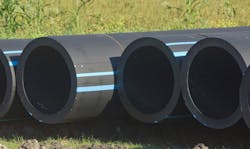Paradise, CA fire’s benzene contamination not related to pipe material
IRVING, TEXAS – The recently completed analysis of benzene contamination found at the site of the 2018 Camp Fire catastrophe near and around Paradise, Calif., has been published by the Plastics Pipe Institute, Inc. (PPI). The 13-page report, PPI Document TR-51 “Investigation of Benzene in Drinking Water Following the “Camp Fire” in Paradise, CA”, is available free at the PPI website -- https://plasticpipe.org/pdf/ppi-tr-51-2020.pdf.
“This is certainly an important document because it provides an empirical analysis of this situation,” stated David M. Fink, president of PPI, the major North American trade association representing all segments of the plastic pipe industry. “Our staff and members conducted this study in response to claims that the melting of high-density polyethylene (HDPE) pipe led to the production of benzene, a carcinogen. These are patently false. There has been no evidence that plastic pipes are responsible for the production of benzene or any other contaminant due to the heating of the pipes during the Camp Fire. It’s clear that the contamination was from the burned-out environment that got sucked into water system. The new document describes the methodology and details the findings of the investigation.”
